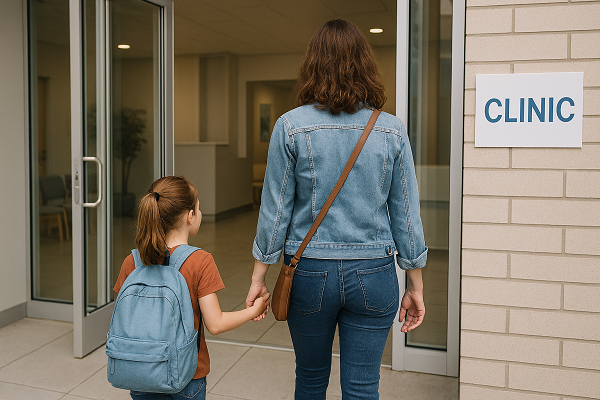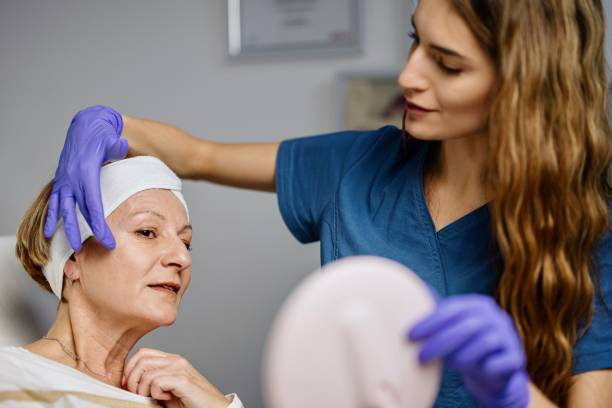The Hidden Link Between Physical Health and Academic Performance
As the school year kicks off, most parents are focused on supplies, schedules, and settling into routines. But one of the most overlooked factors in a child’s academic success is their physical health. It’s not just about avoiding sick days. There’s a deeper connection between how kids feel physically and how they perform in the classroom.
When children are healthy, they’re better equipped to concentrate, retain information, and manage the social and emotional demands of school. A well-rested body supports a well-functioning brain. That’s why annual physicals aren’t just a box to check. They’re a proactive way to set your child up for success.
During a back-to-school physical, providers do more than measure height and weight. They assess vision and hearing, which directly impact learning. A child who’s struggling to see the board or hear instructions may not speak up, but their grades and confidence can suffer. These checkups also help identify underlying issues like sleep disturbances, nutritional deficiencies, or undiagnosed conditions that can affect focus and behavior.
Physicals are also a chance to talk about mental health. Anxiety, attention challenges, and mood shifts often show up during the school year. A trusted provider can help spot early signs and guide families toward resources that support emotional well-being. When kids feel safe and supported, they’re more likely to thrive academically.
Each child adjusts differently. Some jump right in while others need a slower pace. Watch for signs of stress or hesitation and respond with encouragement, storytelling, or even laughter. Let them know it’s okay to feel unsure—and that you’re right there with them.
A centered mindset isn’t just helpful for kids—it’s essential for parents too. Keeping track of paperwork, appointments, schedules and emotions can feel overwhelming. Staying organized and supported allows you to guide your child with clarity and ease as the school year begins.
That’s where Community Quick Care comes in. When it’s time to handle physicals, immunizations and enrollment paperwork, we’re here to support your family with same-day availability, extended hours and Saturday visits. We’re proud to help kids start the school year feeling strong and supported—and help parents breathe a little easier too.
Preparing Young Minds for a Positive School Start
As the first day of school draws closer, children may feel a mix of excitement, nerves, and uncertainty. Helping them build a strong mindset before the bell rings can set the stage for a confident, calm year ahead.
Start by turning anticipation into something positive. Talk about all the new experiences waiting for them—meeting friends, exploring new subjects, and choosing fun school supplies. If possible, visit the school together so they can see their classroom, check out the library or gym, and get familiar with the layout. A preview removes the unknown and boosts confidence.
Mindfulness doesn’t have to be complicated. Younger kids might enjoy sitting quietly with a favorite stuffed toy while breathing slowly and counting to five. Older children could try writing down one hope for the school year before bed or stretching gently to music in the morning. These small habits build self-awareness and help reduce anxiety.
Parents play a powerful role during transitions. Your tone and actions shape your child’s perception of what’s ahead. Keep routines flexible, speak with optimism, and create space for emotions. Something as simple as a deep breath before walking out the door can become a comforting ritual that reinforces connection and calm.
Each child adjusts differently. Some jump right in while others need a slower pace. Watch for signs of stress or hesitation and respond with encouragement, storytelling, or even laughter. Let them know it’s okay to feel unsure—and that you’re right there with them.
A centered mindset isn’t just helpful for kids—it’s essential for parents too. Keeping track of paperwork, appointments, schedules and emotions can feel overwhelming. Staying organized and supported allows you to guide your child with clarity and ease as the school year begins.
That’s where Community Quick Care comes in. When it’s time to handle physicals, immunizations and enrollment paperwork, we’re here to support your family with same-day availability, extended hours and Saturday visits. We’re proud to help kids start the school year feeling strong and supported—and help parents breathe a little easier too.
What to Expect from Your First Jeuveau Treatment
Jeuveau offers a modern solution for smoothing fine lines and wrinkles, giving you a refreshed, natural look with minimal downtime. If you’re trying Jeuveau for the first time, knowing what to expect can help you feel more confident about your treatment.
Your appointment starts with a personalized consultation, where your provider will assess your facial structure and discuss your aesthetic goals. This is the perfect time to ask questions, understand how Jeuveau works, and ensure the treatment aligns with what you’re looking to achieve.
If you’ve used Botox before, Jeuveau works in a similar way. Both are FDA-approved neurotoxins that relax facial muscles to soften wrinkles caused by repetitive expressions like frowning or squinting. Often referred to as “Newtox,” Jeuveau was specifically formulated for aesthetic treatments. Some patients notice a smoother application or faster onset, but individual experiences vary.
Once you’re ready, the provider will cleanse the treatment area and mark precise injection points. Using a fine needle, they will quickly administer Jeuveau with minimal discomfort—most describe it as a slight pinch. The entire process takes just minutes, allowing you to return to your daily activities immediately.
Following treatment, mild redness or slight swelling may appear but usually fades within a few hours. Over the next few days, Jeuveau gradually takes effect, smoothing lines and enhancing your features. Most patients see improvement within three to five days, with full results visible after about two weeks.
To maximize results, follow your provider’s aftercare instructions. Avoid rubbing the treated area and skip intense workouts for the first 24 hours. Your refreshed look can last several months, and touch-up appointments help maintain a smooth, youthful appearance.
For those new to Jeuveau, the experience is simple, comfortable, and effective. With expert guidance and a quick procedure, it’s an easy way to achieve a more youthful, relaxed look—without interrupting your routine.
Weight, Wellness and Why Finding Your Ideal Weight is Key to Women’s Health
As we take time to recognize Women’s Health Month, it’s a great opportunity to reflect on the habits that support lifelong well-being. One of the most essential factors in women’s health is maintaining a balanced weight. A healthy weight isn’t just about appearance. It plays a vital role in energy levels, mobility, heart health, and hormonal balance. For women of all ages, understanding what a healthy weight means and how to achieve it can be life-changing.
The Role of Weight in Overall Health
Your weight impacts nearly every system in the body. Carrying excess weight can increase the risk of chronic conditions like heart disease, diabetes, and joint pain. On the other hand, being underweight can lead to weakened immunity, fatigue, and hormonal imbalances.
The key to wellness isn’t about extremes. It’s about balance. Maintaining a healthy weight helps regulate metabolism, supports muscle strength, and improves overall longevity.

The Connection Between Weight, Heart Health & Hormones
Women’s health is deeply influenced by weight-related factors. The heart, for example, works harder when there’s extra weight to carry. High blood pressure, cholesterol imbalances, and increased inflammation are common issues that arise from excess weight, making heart health an essential consideration.
Hormones also play a role in weight regulation. Insulin resistance, estrogen fluctuations, and thyroid function all contribute to how women gain and lose weight. As metabolism naturally shifts with age, understanding these biological processes can help in making informed decisions about long-term health.
Finding a Sustainable Path to a Healthy Weight
There’s no one-size-fits-all approach to weight management. Some women achieve balance through nutrition and movement, while others may struggle with metabolic challenges that make weight loss difficult.
For those who find conventional approaches ineffective, medical intervention can be a valuable option. Community Quick Care offers Semaglutide, a clinically supported medication that aids in weight management for individuals who need extra support in achieving a healthy weight.
If you’re looking for a way to improve your health while addressing weight concerns, exploring solutions like Semaglutide through Community Quick Care may be worth considering.
The Science Behind Jeuveau: How It Smooths Wrinkles and Fine Lines
Wrinkles—they’re a natural part of aging, but that doesn’t mean we have to embrace every crease that shows up. Thanks to modern science, Jeuveau, an advanced alternative to Botox, has become one of the most effective ways to smooth out fine lines and restore a youthful appearance. But have you ever wondered how it actually works? Let’s break down the science behind this treatment and why it’s a game-changer for wrinkle reduction.
The Magic Behind Jeuveau
Jeuveau works by temporarily relaxing the muscles that cause wrinkles. Many facial wrinkles form due to repeated muscle movements—think smiling, frowning, squinting, or raising your eyebrows. Over time, these expressions create permanent creases in the skin, especially in areas like the forehead and around the eyes.
When Jeuveau is injected, it blocks signals from the nerves to the muscles, preventing them from contracting. This allows the skin above those muscles to relax, softening wrinkles and giving a smoother, refreshed appearance. The result? A natural, youthful look—without looking “frozen” or overdone.

Where Jeuveau Works Best
Jeuveau is particularly effective on dynamic wrinkles, which are caused by repetitive muscle movements. The most common treatment areas include:
- Forehead lines – Smooths horizontal creases caused by raising your brows.
- Frown lines (between the eyebrows) – Reduces the deep “11” lines from furrowing your brows.
- Crow’s feet – Softens fine lines around the outer corners of the eyes caused by smiling.
- Bunny lines – Eases wrinkles on the sides of the nose.
What to Expect From a Jeuveau Treatment
Jeuveau injections are quick, virtually painless, and require no downtime—you can fit them into your lunch break and go back to your day as usual. The effects typically start showing within a few days, with full results in about two weeks. The smooth, wrinkle-free look lasts around 3 to 4 months, after which touch-ups can help maintain your refreshed appearance.
Community Quick Care: Bringing You the Best in Facial Rejuvenation
At Community Quick Care, we’re proud to offer Jeuveau treatments designed for natural-looking results. Whether you’re new to these treatments or a long-time fan, our expert team ensures a comfortable experience with subtle, refined enhancements.
Say goodbye to deep-set lines and hello to a refreshed, confident look. Book an appointment today with Community Quick Care and discover the power of Jeuveau for yourself!









